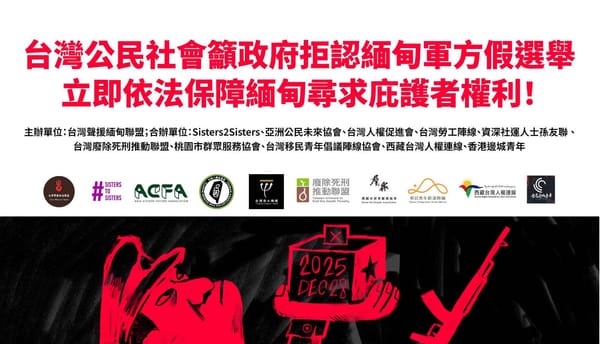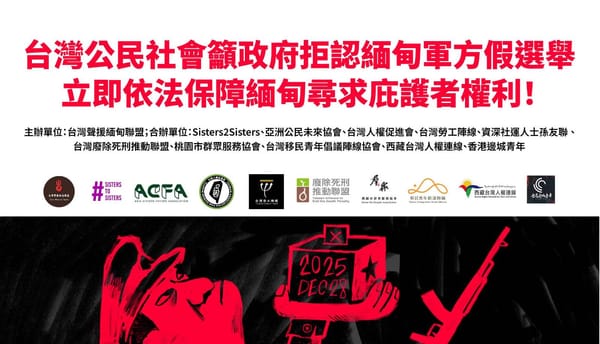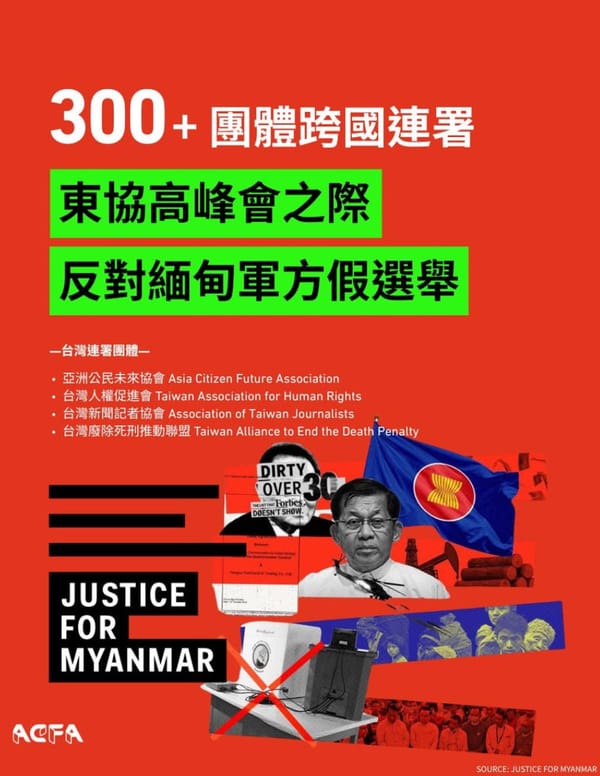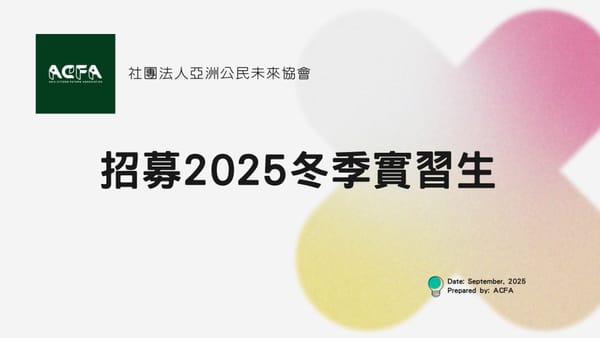Report is out!
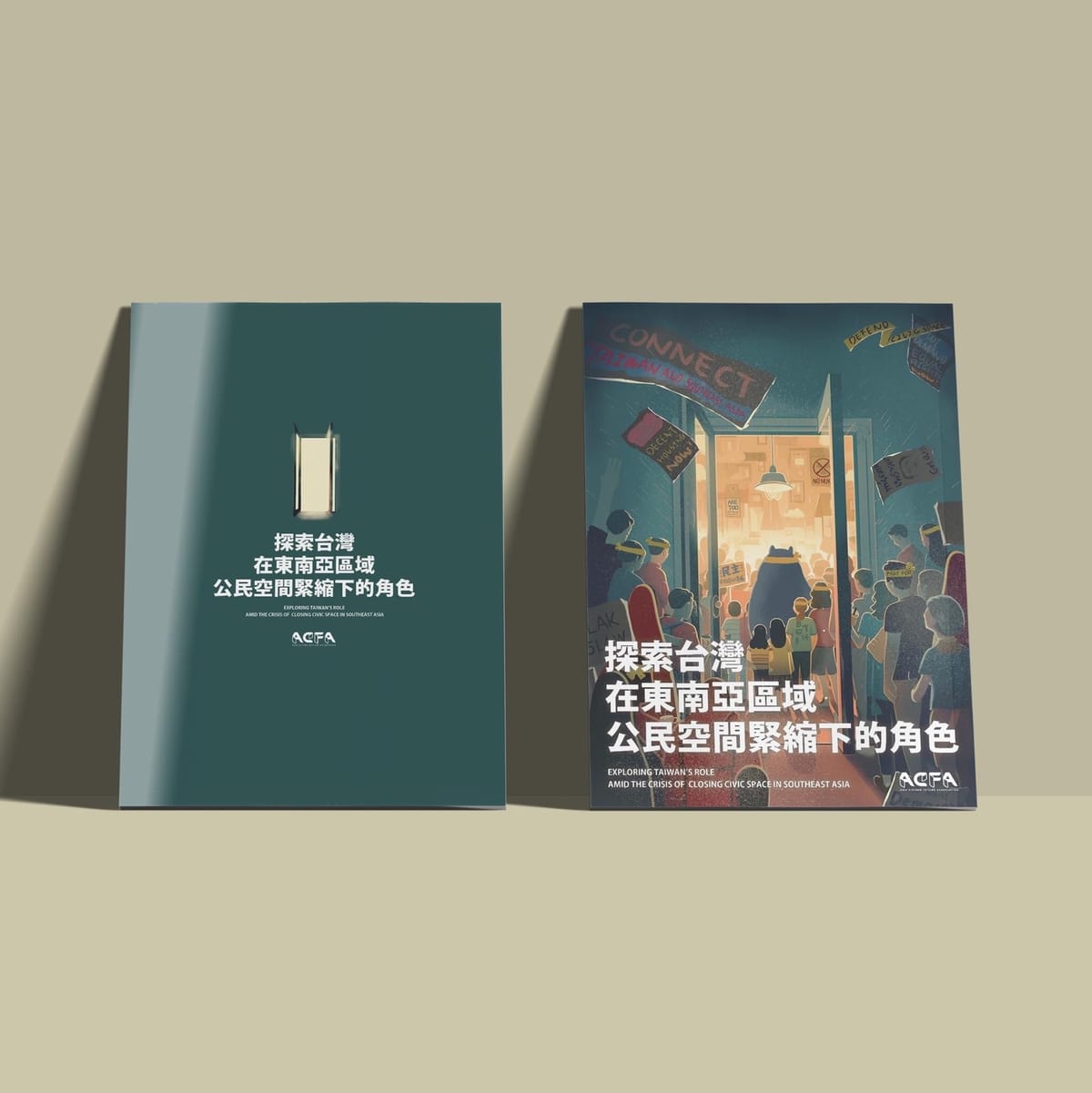
FOREWORD: When Civil Society Organizations Are Seeking Asylum, Is Taiwan an 'Alternative Civic Space' for Them?
Bangkok and Hong Kong were once significant regional hubs for civil society organizations in East and Southeast Asia. Both vibrant and abundant cities hosted organizations from within and outside the region. Grassroots organizations, activists, international foundations, and international non- governmental organizations (INGOs) carried out all kinds of advocacy, trainings, debates, networking, and collaborations for various issues in these hubs. Today, we are still grieving for the bloodshed and crisis in Hong Kong. But we are, at the same time, witnessing Bangkok—once considered the NGO capital of Southeast Asia—becoming a dangerous jungle for asylum seekers, human rights defenders, dissidents and CSOs.
It was a quick process from the initial signs of the deterioration of civic space to its total closure. We have seen a proliferation of political and social control, with the justifications of national security, public health, development, and so forth, pushing their way into our everyday life—making the practice of fundamental human rights costly. Heavy criminal offenses are no longer reserved for prominent social movement leaders or political dissidents, but the survival of civil society organizations (CSOs) are themselves at stake. In such an environment, people become keenly aware of the sometimes subtle, sometimes visible “red line”, and come to know how to avoid and not to step on it. This “red line” and the gradual process where people learn to be aware of it and to avoid it, is the hard evidence of the shrinking civic space that has come to gradually entrap the ‘ordinary people’.
The Asia Citizen Future Association (ACFA) was established with an aim to connect the civil societies among Taiwan and Southeast Asia and to develop the capacity and strategies to defend civic space. Compare to international organizations that tend to provide short-term urgent grants and individual relocation aid, ACFA focuses on building the infrastructure that facilitates collaboration between civil societies in Taiwan and Southeast Asia. We believe that the necessary support for cross-civil society dialogue and regular connections is what generates knowledge and actions for resistance, and that constant actions is what is known as resilience. At the same time, organizations, as collectives of individuals, which have organization charters, governance, and internal cultures of their own, inherently have different needs from the individual activists’ when confronting the threats of closing civic space. Organizations play crucial roles in both the civil society and social movements. Consequently, providing the necessary support for the survival of CSOs is the key to confront the deterioration of regional civic space. Establishing infrastructure for cross-civil society collaboration, then, is a pragmatic and urgent goal for the region, but for this to occur, there are a number of conditions that need to be met.
The research project "Scrutinizing the Accessibility of Taiwan for CSOs From Southeast Asia" and the research report "Exploring Taiwan's Role Amid the Crisis of Closing Civic Space in Southeast Asia" are the primary achievements of the first year of the Asia Citizen Future Association. This report is also our response to the pressing question: 'what role can Taiwan play amid the crisis of closing civic space in Southeast Asia?'
The central question of this research is: whether Taiwan, as a democracy adjacent to the ASEAN region, has the capacity to provide an inclusive 'alternative civic space' to accommodate the surge of asylum-seeking CSOs from Southeast Asia, so as to alleviate the challenge of closing civic space witnessed in Southeast Asia. By assuming the responsibility to protect human rights defenders and allowing them to maintain momentum in practicing human rights and pursue justice, we will be able to further support the development of democracy and human rights in the region.
This study covers two dimensions, with policy recommendations for the Taiwanese government and international donors in the final two chapters.
Through conducting interviews with INGOs and foreign CSOs that have established themselves in Taiwan, this study analyzes the present situation and challenges faced by foreigners when establishing social organizations. It focuses on areas such as employment, taxation, and social insurance in Taiwan. The goal is to gain a deeper understanding of the extent to which Taiwan's civic space is accessible to CSOs from Southeast Asia. Utilizing textual analysis, the study identifies notable inconsistencies between Taiwan's laws related to associations, human rights norms, and international human rights law. Notably, the 'Civil Associations Act' places restrictions on social organizations, limiting their registration to 'associations.' These restrictions encompass aspects such as household registration, the number and conditions of initiators, creating legal hurdles for association registration.
Drawing from existing research on the shrinking of civic space in Southeast Asia, this study conducts in-depth interviews with decision-makers from seven organizations in as many Southeast Asian countries. The primary aim is to comprehend the strategies and necessities pursued by these interviewees in sustaining their organizational activities within high-pressure environments.
Relocating organizations overseas can essentially be understood as a proactive measure, enabling them to manage risks and counteract threats. Our research finds that a mere categorization of relocations as acts of exile might fall short in truly grasping the motivations behind organizations' decisions to operate overseas.
The study does not attempt to make broad generalizations about the situation of CSOs in Southeast Asia solely based on the experiences of seven specific organizations. Instead, the study is aimed at comprehending the strategies and thought processes these organizations employ to deal with their unique situations. This understanding is crucial in identifying the key factors that influence the decisions of Southeast Asian CSOs to relocate.
Simultaneously, this approach empowers readers to gain insights into the nuanced perspectives of Southeast Asian CSOs regarding Taiwan as a potential 'alternate civic space'. This nuanced comprehension equips Taiwan to pragmatically assess its own conditions and contribute effectively to shaping its role within the region, particularly amidst the ongoing crisis revolving around the contraction of civic space.
As a political collective, ASEAN holds a diverse array of interests spanning security, economy, and sovereignty. This diversity often hinders the integration of a cohesive collective agenda. In the face of escalating tensions between the US and China, coupled with rapid shifts in geopolitics, maintaining equidistant diplomacy and hedging behavior becomes increasingly challenging for individual ASEAN member states. The repercussions of this evolving situation on civil society in Southeast Asia, as well as its impact on the delicate relationship between Taiwan and the regional civil society, demand our sustained attention. By fostering a deeper mutual understanding amidst these dynamics, Taiwan can gradually relinquish its ambiguous attitudes and step away from mere lofty ideal of democracy. This transition opens avenues for establishing pragmatic connections and fostering collaborations with its neighboring Southeast Asian countries.
Leah Lin, Executive Director & Founder
Asia Citizen Future Association

